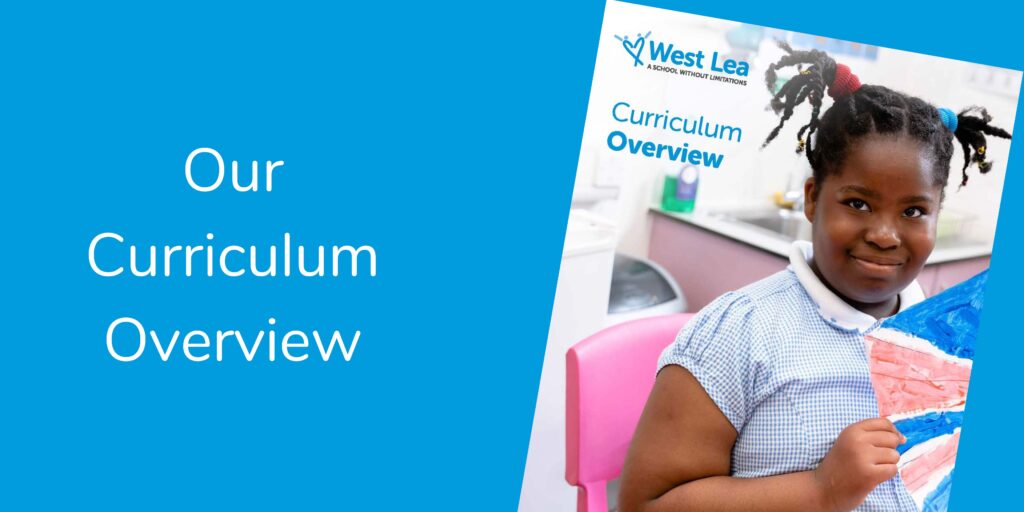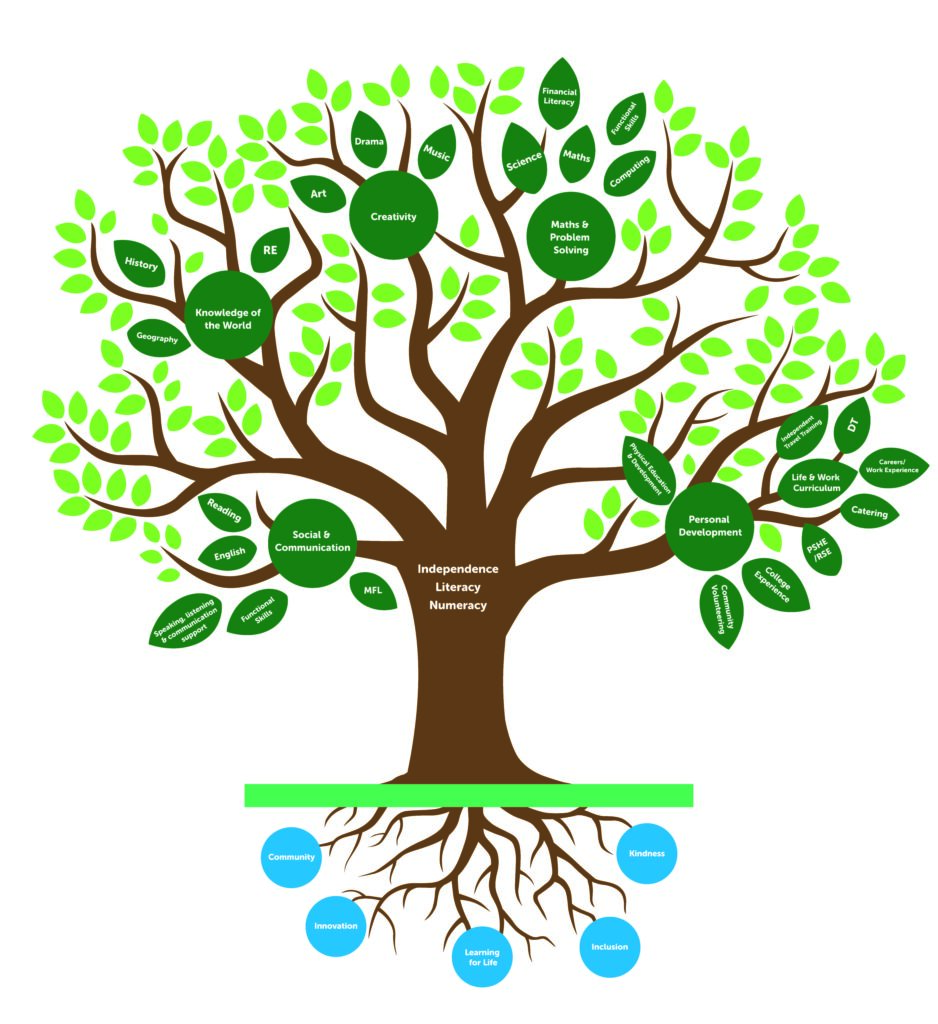Our Curriculum Overview
Learning Domains
Our learning domains and related subjects have been created by taking into consideration the views of pupils, parents/carers, staff and governors. These domains and associated key milestones form our curriculum intent. All areas of learning are closely interlinked, as pupils draw on the knowledge and skills across domains when applying to learning tasks, situations and opportunities. The school’s core values as well as independence, literacy, numeracy and ICT are embedded across all curriculum areas. There is also a focus on developing pupils life skills across the school day, through the curriculum and all that we do.
We fully appreciate every child is different, and we are therefore committed to understanding the motivations, goals and preferred methods of learning. The curriculum has been designed to gradually weave core knowledge and skills into the fabric of the pupil’s day.
At each Key Stage, milestones have been designed coherently, building on the previous Key Stages’ learning goals with the aim of developing pupils’ knowledge and skills in preparation for adulthood.
The Early Years foundation stage (EYFS) curriculum inspires children, provides development and learning opportunities, ensures learning takes place, develops key relationships and makes sure children feel secure in line with EYFS documentation. There are seven areas of the EYFS curriculum divided into three prime areas; (Communication and Language, Personal, Social Emotional Development (PSED) and Physical Development) and four specific areas (maths, literacy, expressive arts and design and understanding the World). We recognise that young children are active learners and they learn through their senses, through exploration, investigation, experimentation, listening & watching as well as through play.
It is important that our pupils have opportunities to interpret their environment, learn to make choices for themselves and grow in confidence understanding their value in our school community. Within our continuous child initiated and child and teacher led provision, we provide play-based learning opportunities aimed to motivate and engage children developing the characteristics of effective learning. This allows us to work towards building and developing relationships and enables us to assess their individual learning styles to prepare children for lifelong learning.
Key Stage 1
The curriculum at Key Stage 1 builds on the EYFS foundations, still using the continuous provision model, but with more adult-directed learning introducing specific, essential knowledge in preparation for more formalised subject-based learning at Key Stage 2.
We support our pupils to develop their independence and self-help skills, and develop a robust and flexible communication pathway. Pupils freely explore a range of motivating and engaging learning opportunities that are skilfully facilitated by adults who are aware of intended learning outcomes and individual next steps.
Taught knowledge is applied in a range of play-based and real- life contexts to ensure flexibility and depth of understanding. We also deliver short bursts of direct, structured teaching of Maths and English as pupils become developmentally ready. We use pupil interests and motivations to guide topic-based planning. Classrooms have continuous provision spaces for playful, child-led learning (such as a role play area, a small world area, construction area, reading area).
Key Stage 2
The curriculum at KS2 develops independence; builds on prior learning to ensure a firm foundation from which to progress and supports pupils to discover their own identity; to find their voice, make it heard and be understood, continuing our emphasis on developing communication, personal and social skills. The needs of each pupil are taken into consideration
Through the use of appropriate and varied resources, we aim to encourage our pupils to be independent learners, using a small steps approach to deepen and build upon prior learning.
In Key Stage 2, there are subject-specific, knowledge-based learning opportunities that are differentiated against a sequenced structure. Our core subjects of Maths, English and PSHE are taught across the week through discrete sessions tailored to individual needs and interests. Foundation subjects of history, geography, creative arts, science, information and communication technology (ICT), music, Religious Education (RE) and Physical education (PE) are covered throughout the academic year and delivered through termly topics. Topics maybe based on National Curriculum programmes of study, current events or pupil motivation. The foundation subjects enrich the curriculum and offer opportunities for pupils to acquire knowledge and provide a context for learning. This allows us to provide a curriculum responsive to individual needs in a stimulating and accessible environment.
The curriculum at KS3 is structured to support learners in making links and connections between areas of knowledge, embedding learning in long-term memory. It builds on prior learning so that pupils reach their optimum potential in core subject areas.
The curriculum supports pupils to make decisions; further develops problem solving skills and builds individuals self-esteem and self-awareness through accessing and evaluating a wide range of learning opportunities.
All Pupils access core National Curriculum subjects of Maths, English and PSHE/RSE through discrete sessions tailored to individual needs and interests. There is a strong focus on phonics, reading, mathematics and PSHE/RSE due their significant impact on future life chances. Some pupils that are excelling in Maths, or English can access lessons taught in KS4 to further develop their skills and knowledge.
Science and Foundation subjects (History, Geography, Art, Music, Drama, ICT, D+T, R.E.) provide a context for learning and are taught in themed blocks or sessions throughout the year to allow pupils to use and apply knowledge and skills developed in the core subjects.PE and swimming are taught throughout the year in individual, group and/or inclusion sessions. Work and Enterprise are also taught at KS3 which prepares learners to access work experience when they transition to KS4.
PSHE/RSE provides an opportunity for pupils to think about themselves, their future and any vocations that they may wish to pursue, looking ahead to KS4 where they can choose their options. Some of our pupils experience job related learning within school such as working with the nursing team or assisting in a primary class.
Key Stage 4 students access a functional curriculum that supports them to utilise the skills that they have acquired as they have progressed through the school and apply them in practical, real-life situations. The focus is on practical application and a deepening of the significance and use of knowledge and skills.
They are encouraged to use decision making skills based on knowledge, personal experience and individual preference, while learning to recognise the impact of decision making on self and others. For all students we continue to offer a personalised, enriching and individual curriculum very much focusing on skills for life and preparation for adulthood.
Our core curriculum offer includes Maths, English, PSHE/RSE, Life Skills and PE with Communication underpinning everything we do to ensure all our students are the best communicators they can be. Students will access these subjects through different pathways depending upon their individual needs.
Students have the opportunity to have taster sessions of the foundation subjects on offer and are supported to choose their own options. These vary from year to year and we encourage students to suggest subjects and be involved in the planning of their learning. For students that are able to access appropriate Edexcel and/or BTEC qualifications in certain subjects, the units of work taught are taken from the functional skills and entry pathways. Students may be entered for external moderation and accreditation if appropriate.
Pupils may also have opportunities to undertake work related learning and where appropriate work experience placements. Along with Enfield Careers, we support and prepare our year 11 students to make their own choices regarding their post-16 journeys.
We recognise the importance of developing confidence, self-esteem and resilience in our young people as they transition into adulthood. This underpins all learning. We ensure that our young people are able to develop and use critical thinking and problem-solving skills in real life situations. There is a strong emphasis on Work Experience and work-related learning within the Department, working towards potential employment opportunities as a future outcome wherever possible in a young person’s local community.
The FE curriculum also offers a select range of opportunities for students to achieve accredited qualifications which are realistic and relevant to their personalised future outcomes. Students are provided with opportunities to access the community safely and as independently as possible. They are also supported to learn new skills which they can then transfer to wider contexts and settings. Enrichment activities are also embedded throughout the curriculum.
For access to our curriculum policy click here.





